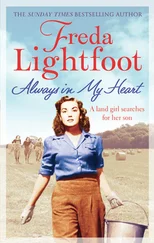What he seemed to be saying did not fully register in the fuzz of emotion that clouded her brain. ‘Oh, no, please don’t go back to the camp yet. I want you to stay and dance with me on this day of celebration.’
After giving a burst of laughter, he said, ‘I’m aware of your fondness for dancing, honey. It’s been great to spend time with you. Have fun and enjoy life, now this blasted war is over.’ He released her and flung his arms around his mates. Joanne felt a cold wind blow over her as she watched them race away then up the steps to the promenade, jump into a jeep and, giving her a wave, they drove away. It came to her in that terrifying moment that these GIs were not simply returning to the camp in Garstang or Warton Military Site where some of them were stationed, but heading back to the United States of America. And she had no notion of where Teddy lived in that far away country, since he’d been interrupted by his mates before getting round to giving her such detail.
Oh, what anguish Joanne felt at losing him. She could but hope he would write to her, knowing she lived with those dear landladies in Jubilee House, once he’d sorted his life out as promised. Or might he forget all about her? What a dreadful prospect. And having lost contact with her mother, as well as their dear brother Danny, uncertain whether either of them was alive or dead, Joanne worried that she might never find any love in her life ever again.
Chapter Two
Evie, her niece Cathie and friend Brenda had together enjoyed the VE celebration for the end of the war. Many local merchant seamen had delivered food for the party, including non-rationed pork, which they’d happily roasted for everyone. What a treat that had been. Now the three of them were sitting in Campfield Market, each savouring a delicious custard tart. The outside market was bustling with people as always, today all chatting and laughing, singing and joking. Here, in the inside market at their favourite café, it was quiet and more relaxed, happily surrounded by smiling faces. Evie watched as a pretty young girl tried on a red felt wide-brimmed hat at Higginson’s millinery stall, turning her head this way and that to admire herself in the mirror, perhaps her way of celebrating.
An ache punctuated her heart as Evie recalled how she’d seen very little of her son and even less of her daughters, Joanne and Megan, since they’d been evacuated. They had spent a brief spell at home back in 1940, when it had initially appeared to be a phoney war, but once the bombing started they were again evacuated.
At first they’d remained easily in touch and she’d gone to help her girls when concerned about the way they were being treated by one family they’d been billeted with. A short time later she’d received no further letters from them to say where they were living, probably because they’d been moved around quite a bit. Evie had too, sadly losing their first home and had rented many other single rooms since. During the Christmas Blitz when one of the grain elevators had been bombed, buildings had collapsed and burned for days afterwards. Many mills and warehouses, including the one she’d worked for, had also suffered fires. How tragic that had been. It had turned into a nasty war, not least to lose touch with her daughters. She’d had to endure severe rationing, hard work at a different mill and the anguish of not knowing whether her missing husband was dead or alive. At times Evie’s strong resilience had faded because of this heart-rending pain and exhaustion. Even now she felt a slur of anguish within her as she longed to have her family back. Would they too be enjoying this celebration?
‘I’m aware this bloody war is still going on in the East, but I live in hope my son and daughters will all be home soon,’ she stoutly announced. ‘They’ve been gone over five years and I’ve missed them so much.’
‘Haven’t you seen them at all?’ Cathie asked, looking stunned.
‘My son Danny is in Cumberland where he’s lived throughout the war. I’ve written to him regularly and did once pay a visit. It took twenty-four hours or more to get so far north with the train constantly halting. And the cost of the journey was considerable, not to mention finding local accommodation. Not an experience I could afford to repeat. He was then moved out to a camp for some reason or other.’
‘Oh, poor you. I’ve every sympathy with that, Aunty. And didn’t you once tell me that you have to pay six shillings a week for their care?’
‘Indeed I do, whenever I can afford to, although thankfully the Government has helped with that cost. Frustratingly, I’ve not received details for some years of exactly where my daughters are. I’ve spoken to our local billeting officer to ask him to investigate where they might have been moved to, presumably somewhere in Cumberland or Westmorland. He’s agreed to look into that for me by contacting the volunteers who do this job in rural areas without pay,’ she said, showing a slight tension in her smile of approval.
Reaching forward, her niece gave her hand a little squeeze. ‘I’m sure they’ll be located and soon be back in your care. Little Heather here is safe too, although as you know we’ve recently lost her mum, my beloved sister,’ she said, tears suddenly flooding her eyes and rolling down her cheeks.
Evie gave a sad smile. ‘I know, dearie. Such a tragedy that Sally should be killed in a road accident having survived this dratted war. Thanks to you this baby is indeed safe and well loved. And, as you know, I’m happy to help child-mind whenever necessary. Oh, it is a bit nerve-wracking when I think the last view of my children was when they too were still young. Now they are so much older I worry about how they’ll react once they do come home. Will I even recognize them?’
Cathie’s friend Brenda gave a little nod. ‘I can understand your concern, Evie. When I was working in France with the Oeuvre de Secours aux Enfants , known as the OSE, many children who had lost touch with their parents developed problems and some had no wish to return home. They might have grown very fond of the family they’d been living with throughout the war, some suffered the loss of memory of their real parents, or their father could be dead and they’d no idea where their mother might be.’ Brenda fell silent, making no mention of what she had suffered in France.
‘Are you saying mine could accuse me of abandoning them?’ Evie asked, filled with a burst of anxiety.
Brenda firmly shook her head. ‘I’m sure yours were much safer than was the case in occupied France. Some suffered a heart-rending and difficult time there. Not at all easy for them. I’m sure your son and daughters will be eager to come home and see you, their beloved mother.’
‘I do hope you’re right.’
‘Why would they not be when you’re such a loving, caring person?’ Cathie said. ‘Your family has been much more fortunate than mine, despite the war. I wish you’d been my mum, instead of my own selfish mother who is always more interested in her string of lovers. Not to mention my absentee father, your brother, whom I haven’t seen in years as he’s apparently living somewhere abroad. But have you heard any news about dear Uncle Donald, your darling husband? Could he be safe and well?’
A crease marred Evie’s brow as she recalled the years of silence she’d endured after he’d been declared missing, constantly worrying over whether he would ever be found or presumed dead. Eventually she was informed that he’d been captured and was being held as a prisoner of war. Now she unfolded a letter and handed it over to her niece with a warm smile. ‘I’ve recently had word that as an ex-PoW he’s now in rehabilitation being cared for by the Civil Settlement Service. They are checking his health and helping him to recover. He’s apparently a bit thin and worn out, but alive and will hopefully be home soon. How wonderful that will be. I can’t wait to see him,’ she said, her face a picture of joy. ‘My dream is to have all my family together again. I do hope you’re right, Brenda, and my son and daughters will be eager to come back home. I will pay attention to any possible problems they might have. Having no idea where they are, I shall go and speak to the billeting officer again, to see if he’s found them.’
Читать дальше











